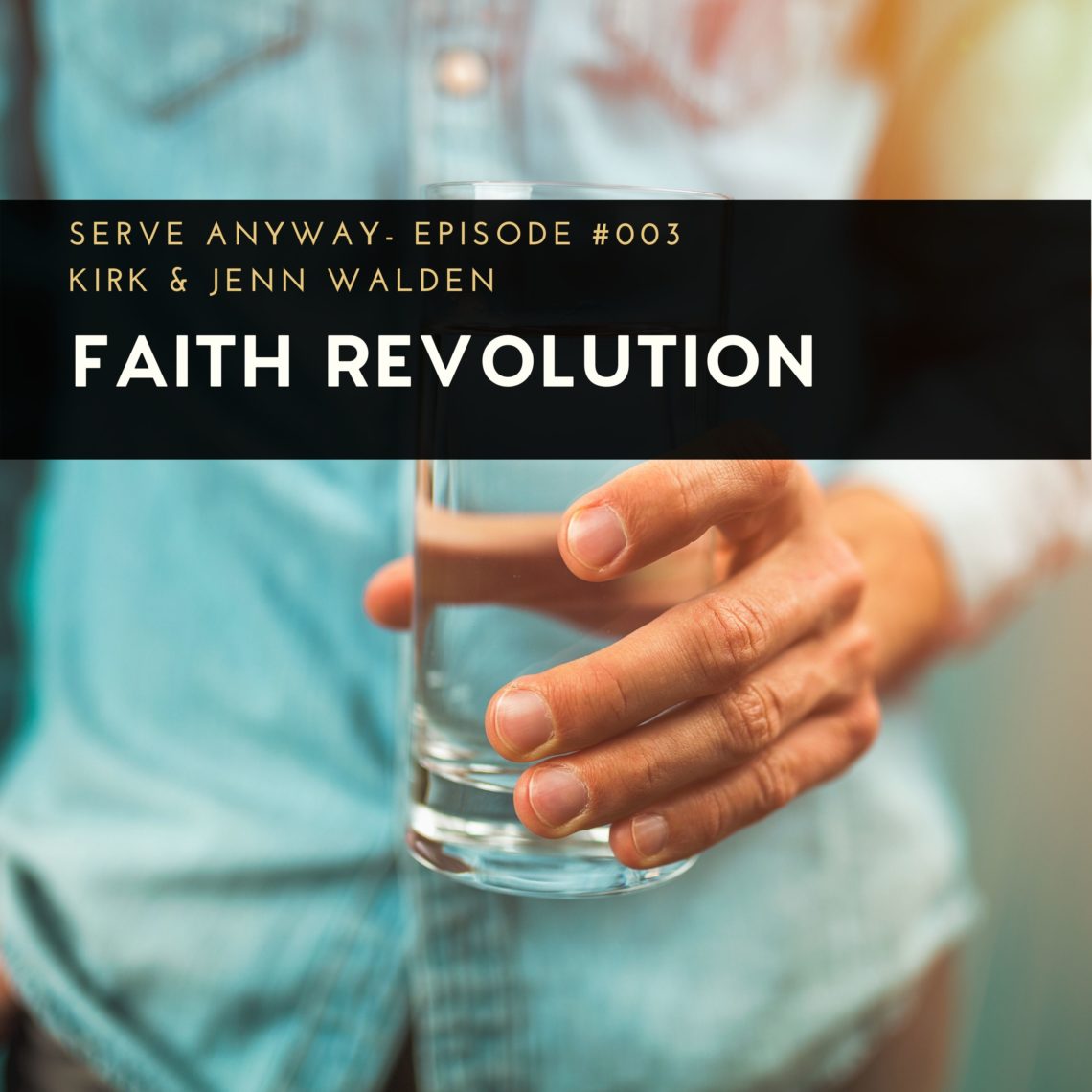
Serve Anyway: 7 Tips for Avoiding Ministry Burnout
In this episode, Kirk and Jenn discuss tips for overcoming ministry burnout. This podcast is for those who serve, whether in a ministry or a non-profit (business leaders might find this helpful, too).
Our Starting Point for This Episode
Entering this discussion, Kirk and Jenn considered the following regarding ministry burnout . . .
- Circumstances that cause those in ministry to become jaded and experience burnout.
- Practical tips for avoiding ministry burnout when serving becomes hard.
To Consider
- Are you currently feeling worn out in your ministry or non-profit?
- How is this potentially affecting those you serve?
- Can you pinpoint sources of your burnout?
- What role do expectations play in your own experience? Although important, how can high expectations potentially lead to burnout?
- How have you unintentionally made someone your project or taken on the task of co-writing their story? What are specific steps you can take to release people and trust God to be the co-author of their story?
- Think of an example, when someone believed in you and saw your potential.
- What are a few simple acts of encouragement that would support others on your servant team?
- “Love Them Anyway, is one of the hardest things we do in ministry. We hope you find some encouragement in this free printable download of the poem Anyway by Mother Theresa and “Encourage Them Day After Day,” from Hebrews 3:13.
FREE DOWNLOAD, Anyway Poem and Hebrews 3:13
References (Click Link)
Episode Transcript
KIRK: Hey friends it is Kirk and Jenn, and today on the podcast we are going to be talking about ministry burnout. We all struggle at different times. I know I do, and Jenn it’s a challenge that we all face. But there are some solutions to this.
TIP #1 – IT’S OKAY TO FEEL JADED
KIRK: We can jump into just a few today because we’re looking at different situations where this ministry burnout pops up, where we get just a little bit jaded, where we lose our confidence in the work that we’re doing, and we lose confidence in the people we’re reaching out to. We can do that, it’s a real thing. So, I think we need to talk about it.
JENN: Yeah, I think you and I have seen it repeatedly as we’ve worked with people serving in ministries across the country. They are so passionate about these populations they’re serving, yet they find themselves feeling worn out, and the burnout rate in ministry, especially on the ground ministry, is very high. And there is a reason. And I’m so glad that we’re talking about this today and see if we can find some practical solutions for dealing with this challenge.
KIRK: I work with pregnancy help ministries, and sometimes you have the person come back again and again and again. She’s single, pregnant. It happens a second time, happens a third time, and the pregnancy help center then becomes their go-to place to continue to have children out of wedlock.
And you want to reach out, you want to provide hope, you want to provide help, but at some point, you reach that time where you just get tired, a little burned out. And it’s because I look at myself and I say, I’m not making a difference. I hate to use this term, but I’m going to have to. It’s easy to become a little bit jaded sometimes. I think we need to be real about that.
It happens, and if you’re out there listening, and go “Yeah, I’ve felt that,” it’s okay. Let’s just talk solutions, let’s not worry about it. Let’s not beat ourselves up over it, and let’s not hide it.
JENN: I love that because it’s like the thing you say in secret. And I understand that, you are passionate about what you’re doing, but you shouldn’t hide when you’re feeling worn out. And I’ve heard the words “repeat offenders” (referring to those who return to a ministry again and again–without any life changes we can see), and this is often a term of defeat. But if we don’t talk about it, then we don’t get the opportunity to encourage one another, to support one another and maybe speak truth into that moment for one another.
You are passionate about your work, but you shouldn’t hide when you’re feeling worn out. -Jenn
TIP 2: KEEP HIGH EXPECTATIONS
KIRK: Yeah, we need to reach out in those situations. And I think what we do is we design protections for ourselves. If we’re not careful, these protections become barriers and walls. The protection we might say is, “Well, God is not calling us to be successful, He’s calling us to be faithful.” The interesting thing about this is, it’s true.
God isn’t calling us to be successful, He is calling us to be faithful, but we use that as a fall back a lot of times. And therefore, if we use that as our fall back, if we get too bought into that instead of just setting it there and saying, “Yes, that’s true. Now, let’s move on and help people.” If we fall into that realm too much, we get to the point where we don’t have great expectations for the potential of people who come in the door.
We simply say, “Look, this homeless person I’m reaching out to is this person who’s in our food ministry, or the person who’s caught up in abuse or whatever,” we say, “Well, he’s just calling us to be faithful.” And we lose sight of the mission just a little bit because that person, we lower our expectations for them.
JENN: I love that and it makes me think of when I was teaching high school, and I was teaching at a school where a large percentage of our children lived in low-income housing, at the poverty level. And it’s so funny, I was a new teacher, so I honestly didn’t know better. I don’t know if I went back today, how I would view all of it. But at that time, to me, it didn’t matter if you lived in the projects and you were in a gang. I didn’t care, I was going to fight for you, and I had expectations of you. And I look back, I’m like, man, I was brazen, but it was “No, you will not put your head on the desk. No, you will write, you will bring paper.”
My expectations for those kids were high. And in my mind, they were not going to fail.
And so that was so important. But let’s face it, teachers get jaded, too. It’s hard work when you’re working with people who don’t appreciate your hard work and they don’t seem to be getting better. And how do you find that energy? So yeah, I think expectations, you have to start with high expectations.
KIRK: And an understanding. Yes, there will be some who disappoint us. There will be those moments when we’ve given all we can give to somebody and they call us up and they say, “I’m not coming back,” or whatever it is. I get that. But at the same time, I think we have to go into this work, whatever work it is, whatever ministry we’re in, whether it’s teaching is our ministry, whether it’s working with pregnancy help centers, whatever it is, we’ve got to go in and say, “I would rather be disappointed than have that person who comes in, if they could read my mind, be disappointed in me because I didn’t believe in them.”
JENN: It reminds me of a story from one of my girlfriends. It’s funny, because we became friends later in life, but she was actually a student at the school where I taught, and she had struggled a lot in school. She would go in day after day and put her head on the desk and just sleep, and basically, her feeling was, “Why didn’t they care enough about me to get my head off of that desk?”
Now, I know she probably would have been an absolute bear, and she would have been a real pain in the butt, frankly, she had a great point. Why didn’t they have higher expectations for her?
KIRK: Good choice of words. You didn’t have to bleep that one out.
JENN: She’s such an amazing human. Her life is an awesome story, but in her teenage years, she was troubled. Her story stuck with me. I think she just wanted those teachers to care enough to say, “Get your head off the desk.” That would have been faith in her, belief that she mattered and that teachers weren’t just being her babysitter.
KIRK: And sometimes, it’s that person who says, “I believe in you.” And it’s hard sometimes because we look at the outward, and it’s hard for us to believe, and that’s where faith comes in.
Can we look into the eyes of people and say, “I believe in you, I believe in the greatness that God has given you.” -Kirk
We’re talking about the Faith Revolution. Sometimes, that revolution really has to begin with us, to look at people and say, “I believe in you, I believe in the greatness that God has given you.”
And it may sound silly but we’ve got to do it, we’ve got to believe. And I understand it’s hard, I get it. Because again, the circumstance of what we can see, we can’t see what God can see sometimes. And yes, we’re going to get disappointed, but I want that person, whoever it is I’m working with, to be able to look at me and say, “This person believes in me,” and I’ve got to be willing to be hurt. It’s got to be okay to be hurt and say, “God, give me a tenderness there, that if she or he disappoints me, doesn’t meet the expectations that I know you have on them, God, if they don’t reach it, I’m gonna be okay with that.”
Jesus had to deal with that just a few times, and yet he did it anyway. And we see him with the Samaritan woman at the well, nobody believed in Samaritans. Those people weren’t real Jewish people. “We don’t even walk through their villages.” Jesus not only walked through the village, he talked to her, he spent time with her, and she was about the first person, I believe, that he ever told, “I am the Messiah.” First time he said it plainly, and he picks the Samaritan woman.
He believed in her, he had expectations. And from what we can tell, even though the narrative doesn’t go through her life, her entire life, from what we can tell, it changed her thinking and it changed who she was, so he did that. And yet other times, he’d share great truths, and people would walk away, but he was willing to be hurt. And I think part of it for us is, I’ve got to be willing to take the hurt when somebody doesn’t make it, because yes, it’s true, that can happen, and will.
And in keeping with that, I think about expectations and not that we put expectations. I really think I need to use the word potential. We need to see the potential in the people we’re reaching out to, even when it’s hard to see. Remember Jesus saw the potential in the Samaritan woman. We need to see the potential.
And we also need to get rid of this thinking that we’re not going to reach them all. I understand it’s true. We won’t reach everybody, I get that, but I think we need to dispel ourselves, or get rid of that thinking. I had a golf coach in college who said, “They tell us you can’t make ’em all (as in, every putt).”
He said, “Why not?”
And I thought, “He’s right. Why can’t you make them all? You’re going to miss some . . . I know, I know. But why don’t I go into each round that I play thinking I could make them all today. Who knows?”
JENN: Well, it’s like when you go fishing. Okay, are we going to take our little pole? Are we gonna take a net? And some will not get caught in that net, if you know anything about fishing nets, some of them won’t . . . They’ll even be able to swim through.
KIRK: Wiggle out, yeah.
JENN: But which is better? I think we need nets, I don’t think we need fishing poles. I don’t know, that’s just a thought I have, it’s like he’s about the big picture of humanity. And we get so laser focused on one relationship or one person, and that will jade us. That could wear you out really fast.
TIP 3: REMEMBER WHOSE MINISTRY IT IS
JENN: Yeah, but I do have to say this. And you taught me this, at least you made me think about it.
KIRK: So you’re gonna push back on me on something I already said. That is not fair.
JENN: You are correct.
KIRK: We’re going to cut this thing right now.
JENN: No, I think that one of the reasons we get burnout is because we make people our projects. We kind of, in a weird way, take ownership of writing their story of faith. It’s part of our book. We’re the author of this relationship with somebody, and authoring their salvation with them. And I think that’s a huge mistake. I have to sometimes be satisfied knowing I was a sentence in their story, and I may never even know the end result of the seed that I planted in their life.
KIRK: Another one I hadn’t thought about until we started talking was the idea of “My Ministry.”
If it’s my ministry, then I need to see the results, because my ministry is lousy if I don’t see results. No, I’m a part of God’s outreach through Jesus Christ. He’s reaching out to people. And guess what? I get to play a role here. And as you said that I said that you are pushing back on me, whatever. But as you said, we may be a sentence in their story, in their entire volume of their biography.
We may be a sentence, we could be a paragraph, we could be a chapter. And we may be weaved throughout their story all the way through the chapters. We don’t know, but when we decide that their book is kind of “my” book, that I’m writing with them, then we’ve crossed a line. No, it may be that your character now moves to another place, and their character keeps moving forward and you have to trust that there are others. It’s not “your” ministry in their life. There are certain things that you need to do, certain roles that you play. But you’re not the end of their story.
Sometimes you are only a sentence in someone’s story–trust God to continue writing their story. -Kirk
KIRK: And I’ve got a friend who . . . I was sitting with him at Burger King, and he was talking about his faith and the moment that he committed his life to follow Jesus Christ. He’s a great guy, has several adoptive kids and just talks about faith all the time, but as he was talking to me about it, he didn’t mention my role in his life. And it hurt me just a little bit.
He said, “Yeah, so and so did this, and that’s what did it,” and I had to go back and kind of go to the Lord with that and say, “He didn’t say a word about me. And what about my part in his story? because I know I played a role leading up to a lot of those things.”
Because we had been friends for a while and we had talked about faith and different things. He was talking about the moment he committed his life to the Lord.
That moment wasn’t with me, it was with somebody else, but I had to go back and say, “You know what? I don’t have to be the hero in his story. I could be a guide for certain points and I know that I know I played a role.”
JENN: And I think I’ve had that experience as a teacher. This happened every year almost, that I taught, and it would always be a shock to me every time it happened. I would have certain kids who were super quiet. 90% of the time, I would look at their face, and think they hate this class. And they do not want to be here, or they just didn’t seem to be enjoying themselves.
And we get to the end of the year or even sometimes a couple of years down the road, those same kids would write to me or come and visit me and say, “I just want to thank you.” And then they would start talking about how that experience changed them, how maybe they became more bold and able to speak in class more confidently. I get teary eyed just thinking about it.
Sometimes, it’s the people who look the hardest or are the coldest in our lives and in our moments that actually are being changed or being helped by us in a way we could never imagine.
JENN: And I just pray for everybody out there right now who is experiencing a hard place in ministry, that maybe God will refresh that for you by bringing people either to mind, or maybe they’ll just pop up for you and say, “Hey, I just want to thank you. You really have made a difference,” and we need that reminder. And I think God can provide that for us, to help us keep that energy to keep fighting the fight to help people.
TIP 4: PRAY TO SEE POTENTIAL
KIRK: And I want to hit on a couple of things there. What are solutions? What are some things–what can we do practically? Because I want you to come away from this podcast saying, “This is what I’m going to do tomorrow.” And one that pops into my mind is when you are reaching out to somebody in a hard situation, one of the first things, before they even come in, say, “Father, give me eyes to see them as you do, to see their potential, and to speak to their potential with them while I’m there.” Because it’s easy, when we’re jaded. We can get judgmental really quickly.
We can be that person that says, “What is God saying about your lifestyle right now?” I don’t know–I think that’s more coming from a heart of being burned out, because by golly, we’re just going to have to give it to them with both barrels. They’re going to have to see it today. I wonder, if we step back and say, “Today, I’m going to talk to them about their potential, about the joy they can have, and about the fact that I believe in them, and when I get to a point to where I’m at that point where I want to say, “By golly, it’s time to give them the judgment, I instead give them the potential.”
Because if you look at Jesus’ life, the folks who he gave the judgment to were the self righteous who thought they had it all figured out. He didn’t give the judgment to the hurting and the broken. When the woman caught in adultery came to him, he didn’t rip on her for what she had done. He faced his animus toward those people who were judging her.
And I know there are times when we need to speak truth, I get that. I’m not trying to dodge that, but I think we need to move toward the potential that God has for them. “Father, help me see the potential, and when it starts bubbling up in me that I need to give them the judgment, I need to step back and give them the potential.” And that, to me, is a practical idea that we can put forth today.
TIP 5 – ENCOURAGE ONE ANOTHER
KIRK: And another one comes right out of the book of Hebrews. One of my favorite verses, Hebrews 3:13 tells us, “But encourage one another, day after day.” The writer of Hebrews says, “I don’t want your hearts to be hardened by the deceitfulness of sin. And we could unpack that for an hour, but the point being, if I spend my time encouraging my coworkers in the faith, if I spend my time encouraging those people who come into our offices or our ministry or that we go out to, if I spend my time encouraging them, it’s an antidote for hardening of the heart. This one person said, hardening of the ‘hearteries’.
And so that’s the thing, if I will focus on being an encourager today, around my office, in my ministry, in my life, whatever it is, whether I’m a teacher, whether I’m a pharmacist, whether I’m a doctor, whatever I am. If I focus on encouragement, if that’s what I intend to do today, I think it’ll change others, but it’ll also change me. It will keep me from being jaded because I’m looking for the good, and it needs to be an honest encouragement.
 I think about the GEICO commercial with Pinocchio, and he’s a motivational speaker and he says, “I see the potential of everyone in this room.” And you see the nose start to grow as you look around the room, and these folks don’t look like they have a lot of potential. And Pinocchio knows he’s lying. I think if we practice encouragement, we’ll begin to get to the point, even if we’re a little hardened, a little jaded. And again, I want to step back and say it’s okay. We’re not talking about this sin of being hardened. What we’re trying to do is say, “Let’s be real about it, let’s face the fact that it is part of what we do and we need to overcome it on a daily basis.” Jump in, Jenn.
I think about the GEICO commercial with Pinocchio, and he’s a motivational speaker and he says, “I see the potential of everyone in this room.” And you see the nose start to grow as you look around the room, and these folks don’t look like they have a lot of potential. And Pinocchio knows he’s lying. I think if we practice encouragement, we’ll begin to get to the point, even if we’re a little hardened, a little jaded. And again, I want to step back and say it’s okay. We’re not talking about this sin of being hardened. What we’re trying to do is say, “Let’s be real about it, let’s face the fact that it is part of what we do and we need to overcome it on a daily basis.” Jump in, Jenn.
TIP 6 – LISTEN TO THE KIDS
JENN: Well, we used to talk about this in education, the teachers who had kind of gotten jaded.
I don’t know, because I was young. So, who knows what I would feel now, but I think for those of us who are older, surround yourself by some younger energetic people and be willing to listen to them.
I think with us, we have surrounded ourselves by some younger faithful people that are just amazing. Man, they challenge us and I love it. They’re in their 20s still. They’re on fire and they’re just ready to go. And sometimes they drive me nuts, to be honest. Because I’m like, “Oh my word, seriously? No, I do not have the energy for that.” But they keep me focused and energized and excited, frankly, and challenge me to keep looking ahead and not. So I just want to encourage people in ministry out there. Don’t get so jaded and convinced you know it all, to the point that you’re not willing to surround yourself with these young people. I think we’re supposed to listen to these kids, because they’re still kids to me.
 KIRK: When I was young in this work, I became a director of a pregnancy center when I was 28. I’d go to conferences, and I’d see some people walking around, and they would tell people, “I’ve been in the movement for this long, and I know . . .” And you come up with an idea and they’d say, “We’ve tried that and that doesn’t work.” Well, no, let’s try it again. Or, let’s try it in a different way. So having these young people around now that I’m old, I am trying my best not to look at someone who has a new idea, and go, “Well, this is . . . I think you need to use the tried and true.” Hey, let’s think new, let’s think fresh.
KIRK: When I was young in this work, I became a director of a pregnancy center when I was 28. I’d go to conferences, and I’d see some people walking around, and they would tell people, “I’ve been in the movement for this long, and I know . . .” And you come up with an idea and they’d say, “We’ve tried that and that doesn’t work.” Well, no, let’s try it again. Or, let’s try it in a different way. So having these young people around now that I’m old, I am trying my best not to look at someone who has a new idea, and go, “Well, this is . . . I think you need to use the tried and true.” Hey, let’s think new, let’s think fresh.
JENN: I think they’ll leave us behind, honestly.
KIRK: You’re right.
JENN: If we don’t catch up with them and we don’t listen to their voices and their energy and their hearts, we’re going to get left behind. We can choose to go with them and sort of what might feel like recklessness sometimes, or we can just sit in our stubbornness. But honestly, I think they’ll leave us in the dust, because they’re ready, they want to go.
KIRK: That’s a whole other podcast. But you look at Gen X and Gen Y, Millennials, and all that kind of stuff, all these . . . I don’t know all my gens right now, but I know you, Jenn.
But other than that, I don’t know them real well but I do know, in young people today, they are idealists. A lot of us older folks, I’m still a boomer, and people make fun of boomers now, but I’m one of the last of the boomer generation. But we make fun of Millenials because one of the jokes is they get into a job and wonder three months in how they haven’t changed the world. And we say, “Just make your widgets, pal. That’s what you do in your first years.”
But there’s something beautiful about that. They do want to change the world, and we need to have a little bit of that idealism today.
Now, I go back to my golf coach who said, “Why can’t you make every putt?” And as challenging people come in, I think we need a little bit of that mindset. As people come into our ministry or whatever we’re doing in this world, are we seeing the potential? Why not? Why not them? Jesus looked at a guy named Saul, and said, “Why not this guy to help lead everything that I’m doing?” and Paul did. And I’m thinking, wow, if we can do that, we’re in pretty good shape.
JENN: Okay, I have one last point and I’ll be done.
KIRK: You can do one last point.
TIP 7: LOVE THEM ANYWAY
JENN: I think about Mother Teresa and borrowing from a poem that she wrote, and playing off of her words . . . People will seem hard and dismiss you. Love them anyway, serve them anyway. People will be repeat offenders, love them anyway. People will take advantage of your work and your heart, love them and serve them anyway.
I’ve talked to friends who are in ministry across the country, and that’s something that is a characteristic of those who haven’t gotten jaded. I know that’s their heart, and I know that they believe in the model, “Love Them Anyway.”
KIRK: We love them anyway. Even if it hurts us. And I think that’s the power of who we can be as Christians, saying “I’m willing to put myself out there, knowing that at times, it’s going to hurt.” But I’ll do it anyway, because I know Jesus put himself out there, even though it hurt. And he was willing to do that. But look what he spawned. He spawned a church, and we get to follow him today. That’s a great example of what it means to follow him and say, “I’m willing to be hurt because I’m willing to believe, even when I can’t see it.”
Are we willing to follow Jesus and say, “I am willing to be hurt because I am determined to believe, even when I can’t see it?” -Kirk
7 Tips for Avoiding Ministry Burnout
Its Okay to Feel Jaded
Keep High Expectations
Remember Whose Ministry It Is
Pray to See Potential
Encourage One Another
Listen to Youthful Exuberance
Love them Anyway
JENN: This has been awesome. I’ve really enjoyed this time with you, Kirk Walden.
KIRK: Well, I’ve enjoyed it too, Jenn, and thank all of you for allowing us into your homes, into your cars, into your walks, into your jogs, or whatever it is. So it’s been a joy and hope you’ll come back.
Pin this Post...
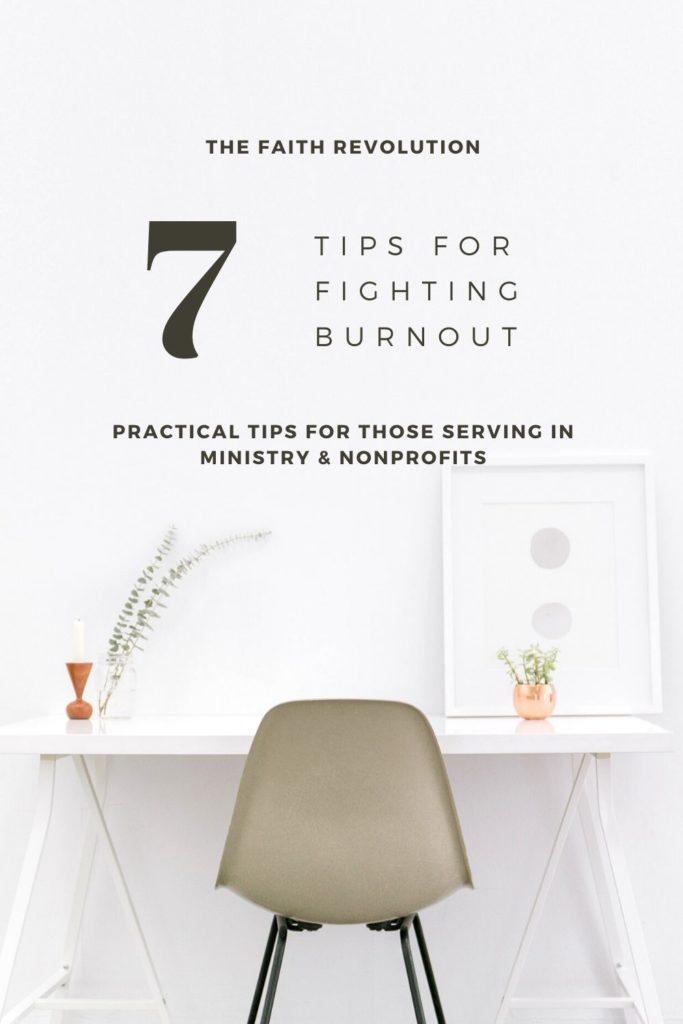
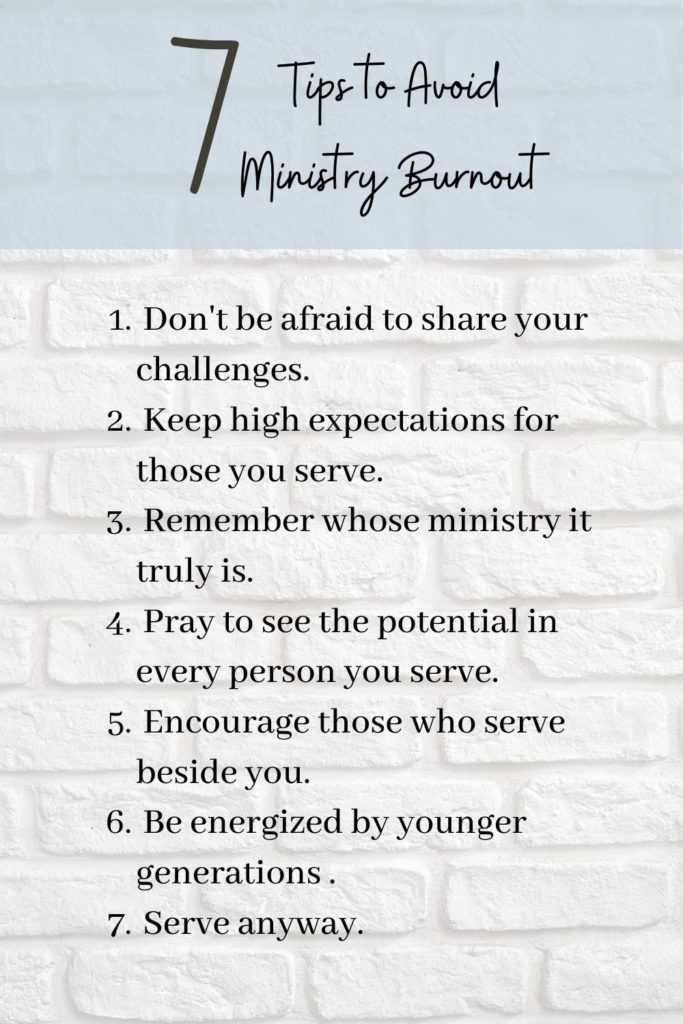
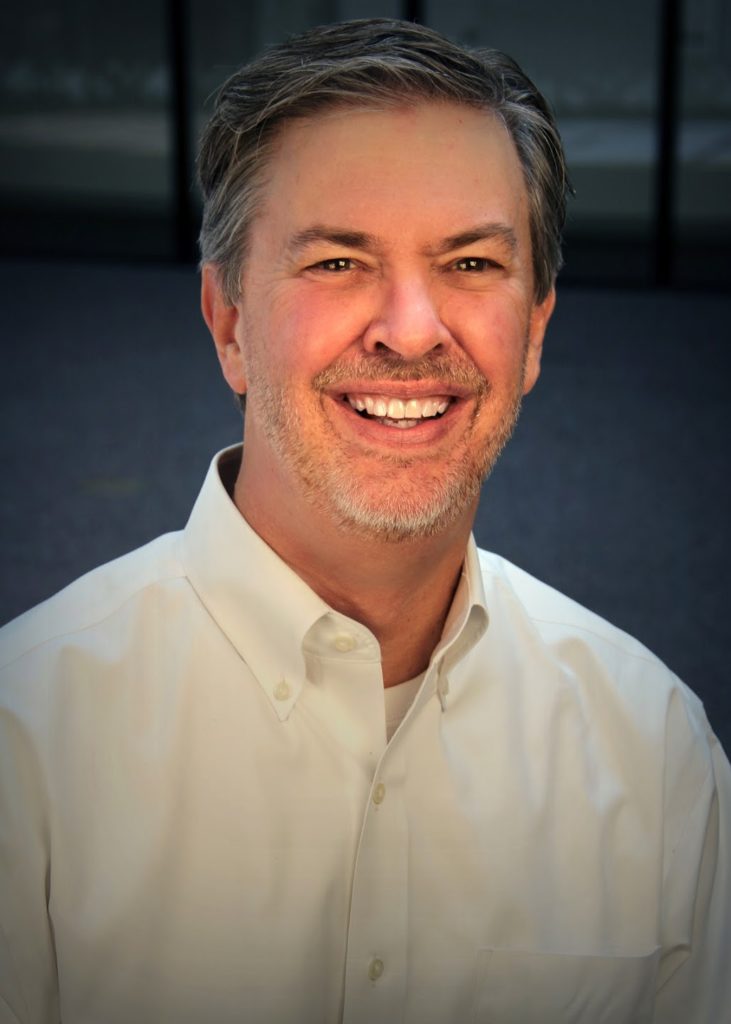
Kirk Walden is a Christian speaker and author. He works with ministries across the world as a consultant and advancement specialist.
The Faith Revolution Podcast was born out of a desire to see faith become more accessible and culture changing -anyone at anytime can have faith.
Accessibility is found in peeling off layers of religious complexity and embracing the deep roots of simplicity found in Jesus.
Click here to find Kirk’s Event Schedule.
Kirk’s wife, Jenn Walden, is a frequent co-host of The Faith Revolution Podcast. She can be found at her home on the web, Jenn’s Closet; a community where women are uniting as influencers of fashionable faith.



You May Also Like

One Step Changes the World
December 29, 2019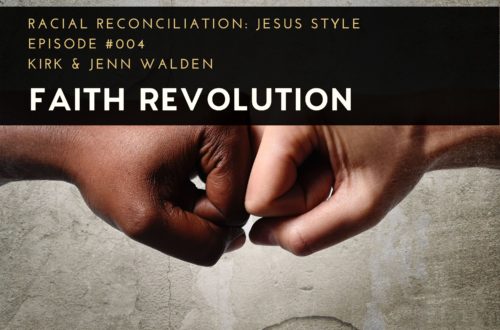
Racial Reconciliation: Jesus Style
June 11, 2020